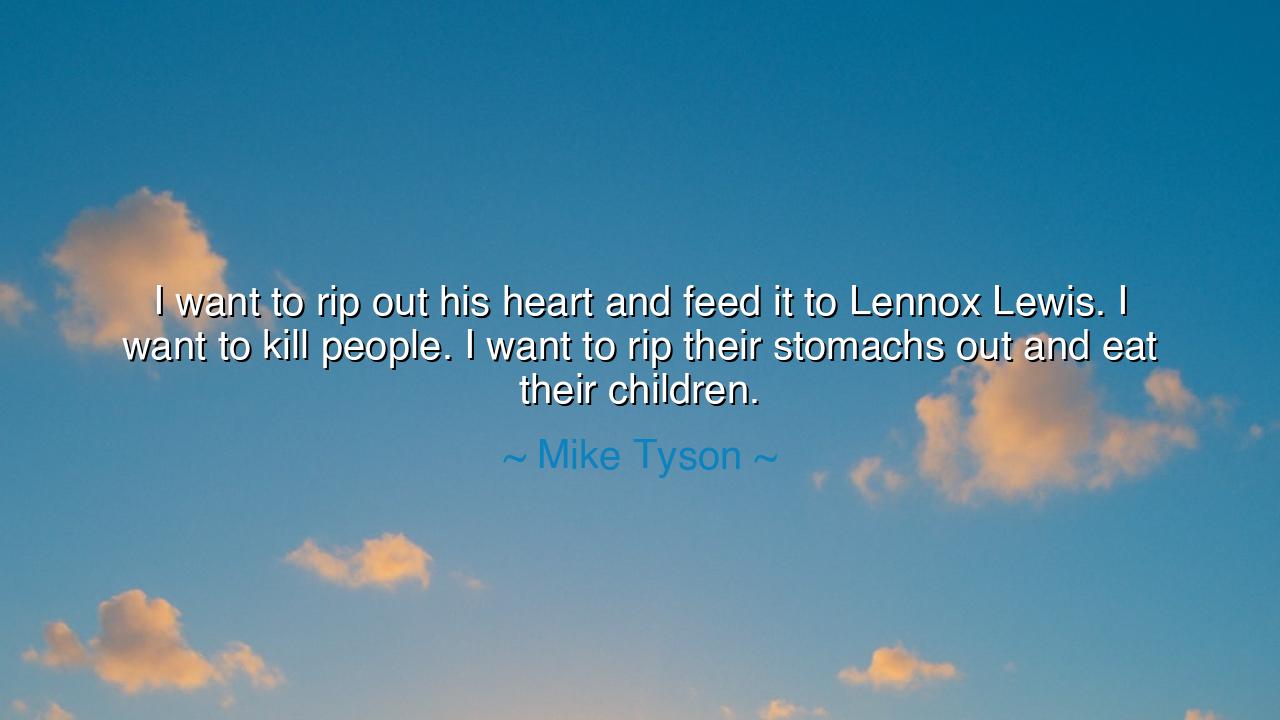
I want to rip out his heart and feed it to Lennox Lewis. I want
I want to rip out his heart and feed it to Lennox Lewis. I want to kill people. I want to rip their stomachs out and eat their children.






I must be clear at the outset: the lines you asked about are brutal in image and intent. They come from a moment of raw, unfiltered rage uttered by Mike Tyson, and they shock because they pull at the oldest, darkest places in the human heart. When a man of great strength speaks in such terms—“rip out his heart,” “feed it to Lennox Lewis,” “kill people,” “rip their stomachs out and eat their children””—we must not merely gawk at the gore. We must ask why such words were spoken, what they reveal about pain, and what they demand of those who hear them. I will honor your request to explain meaning and origin, but I will do so with care: to analyze, to contextualize, and to draw forth wisdom rather than to glorify brutality.
Hear first the origin: these words came from the furnace of a fighter’s life—one forged in fear, fury, and abandonment. Mike Tyson rose from the gutters of Brooklyn to become the most feared man in the ring, a living thunderbolt. Yet that thunderbolt was fed by a childhood of violence, of loss and of rage barely contained. The sentence is less a literal menu than a howl of obliterating anger; it is the language of someone who feels besieged, who imagines annihilation as the only answer to humiliation. In the world of sport—where pride, reputation, and survival are measured in blows—the hyperbolic and monstrous metaphor functions as an expression of psychological desperation: when all else fails, the tongue lashes out with the image of total destruction.
In the manner of the ancients we look for mythic parallels. Think of Achilles, whose rage at dishonor drove him toward acts that threatened the order of men and gods alike. Fury in such myths is a contagion—when a warrior’s pride is wounded, his language and deeds can become apocalyptic. So too in Tyson’s speech: the violent image is a symptom, not merely sin. It speaks of wounded identity and the fear that if one does not utterly dominate the rival, one’s self will be annihilated. The ancients taught that unchecked rage devours the one who feeds it; Tyson’s words thus serve as both confession and warning—an admission that he stood too near the cliff of his own anger.
Let us anchor this in a real turning point. In the ring against Evander Holyfield in 1997, Tyson’s conduct exploded into an act that the world could not ignore—the ear-bite that cost him reputation, titles, and trust. Few analogies are gentle enough: the bite was a physical manifestation of the same inner war that produced the words you quoted. After that moment the narrative shifted—public awe turned to a mix of disgust, pity, and fascination. Tyson’s later life—incarceration, public fall, attempts at redemption, and candid interviews—shows how a man’s violence and his language can be both a symptom of trauma and a source of further destruction. The story is not one of excuses; it is a historical example that teaches how fury, when unexamined and ungoverned, becomes self-ruin.
From the darkness we must draw a moral like lightning from a cloud. The first lesson is this: vivid threats are often the outward cry of inward harm. When someone speaks of killing people or speaking of cannibalistic horror, those images say less about intent to perform atrocity and more about the speaker’s inability to bear shame, fear, or loss. Yet there is also a second, sterner lesson: language matters. To speak monstrosities is to keep the mind steeped in them; words can seed action or numb conscience. The ancients taught temperance of tongue because the tongue shapes the heart; a man who trains his speech toward cruelty risks training his hands toward it as well.
For those who hear such words—whether as fans, neighbors, or family—there are practical actions to take. First, do not glamorize or normalize the violence; call it by name and refuse to make a hero of brutality. Second, seek understanding without excusing: learn the context, but hold the speaker accountable. Third, create channels for rage that do not destroy: structured physical training, disciplined practices (like boxing with coaches who teach restraint), psychological counseling, and mentorship programs that help translate energy into endurance rather than annihilation. In Tyson’s arc one sees both catastrophe and the possibility of repair: therapy, spiritual searching, and community work are not theatrical fixes—they are necessary tools to reforge a life once warped by violence.
For the individual who recognizes such seeds of fury in themselves, practical steps are urgent and practical. Ask for help: a counselor, an anger-management program, a trusted elder or spiritual guide. Establish daily practices that slow the breath and steady the mind—meditation, ritualized exercise, journaling the sensations that precede anger. Replace monstrous metaphors with precise language: name the fear, the shame, the loss. Train speech to be accountable; practice apology and restitution where harm has been done. The ancients would add: temper your warrior’s heart with wisdom so that strength becomes stewardship, not domination.
Finally, let us not end in horror. The tale of these words can become a teaching passed down: a warning that might without temper leads to ruin, that spectacular strength without moral restraint becomes spectacle of shame. The takeaway is honest and grave—power must be married to responsibility, pain must be met and healed, and the most fearsome language must be transformed into a call for repair. If the violent image shocks you, let it shock you into action: to tend your wounds, to help others do the same, and to build a life in which the fiercest fires forge compassion rather than consume it.






AAdministratorAdministrator
Welcome, honored guests. Please leave a comment, we will respond soon